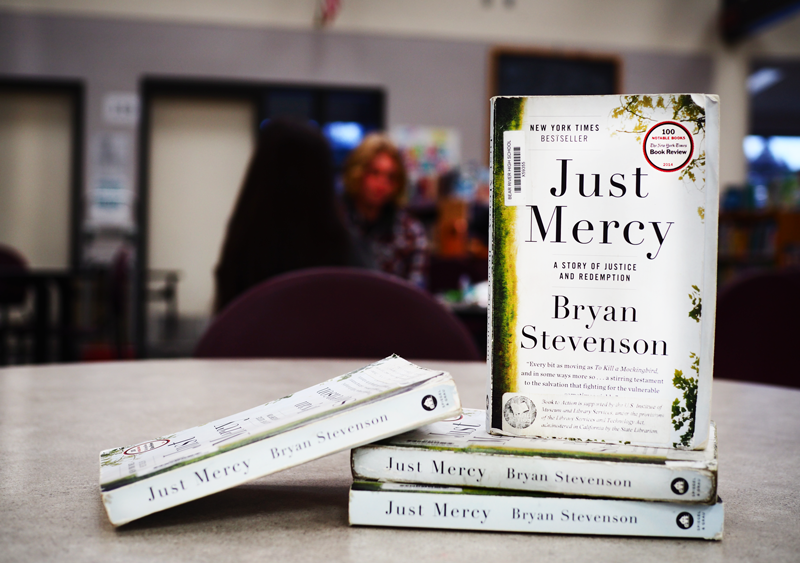If you took English 1X your freshman year, you likely remember English Teacher Sherlyn Reafsnyder passing out a little book called Just Mercy by Bryan Stevenson.
This autobiographical novel follows the journey of a young, black lawyer traveling to Monroe County, Alabama with a Harvard Law degree and a hunger for social progress. Stevenson takes his readers through personal experiences defending underrepresented inmates fighting for their lives on death row. In synopsis, it is an endearing story of southern African American communities fighting for the rights and protections they rightfully deserve through the eyes of a single man.
Though this novel features concepts of civil rights that Bear River students passionately support, it was never a class favorite. In fact, many agree that it was the most tedious page-turner of freshman year. The main reason was that, though people supported the author’s cause, they disapproved of his arrogantly righteous presentation and two-dimensional depiction in the novel. When I heard there was a movie rendition of Just Mercy, I was hesitant to dedicate more than two hours of my life to relive this notorious unit of our freshman curriculum. However, now having seen it, I can sincerely say it has many redeeming qualities to leave a better taste in your mouth than the book.
The only major critique I have of this movie is, fittingly, the main character. If you decide to see this movie, don’t watch it for Micheal B. Jordan’s performance of Bryan Stevenson. His flat, static development throughout the story greatly resembles that of the novel. A combination of bad script-writing and dispassionate acting makes this character the least memorable part of the movie.
When this character talks about his past, it feels as though he only has the SparkNotes summary to go off of. Other than a very brief scene showing his family’s concerns and disapproval, the character mainly reveals very concrete facts about his past. Jordan’s delivery of this information also feels like forced, pre-recorded responses. When this character talks about hopes for the future, it feels like he is reading off cue cards stripped directly from cliche quotes of the book. Jordan’s delivery is believable enough, but the audience can’t help but cringe at truism within his speeches.
If you decide to see this movie, watch it for the talent of the supporting actors, especially that of the family and the inmates Stevenson defends. The main court case this movie follows is McMillian v. Monroe County, Alabama. Walter “Johnny D” McMillian is a husband and father of three children of a poor, black community in the outskirts of Monroe. After being wrongfully convicted of murder, he is torn away from his family as he awaits trial and his eventual death row sentence in prison.
To get a more personal outlook on this case, Stevenson decides to visit the family. I thought that the crowd meeting at the McMillian household did a phenomenal job portraying the pain and fear of losing family to prejudice of law enforcement and the local court system. The mother, Minnie, gave a chilling speech at the dinner table. She asks how she is supposed to teach her children to stay out of trouble if an innocent man can be convicted of a crime that occurred in town while he was in his home surrounded by family. Also, the presence of other community members reinforced a very sweet idea of southern hospitality. I couldn’t help but giggle as an older lady kept refilling Stevenson’s glass to the brim though only a sip was missing.
But the true gem of this movie comes from the performance of the inmates on death row. A touching subplot of the movie follows the relationship of three companions fated to die at the hands of capital punishment. Walter McMillian, Herbert Richardson, and Anthony Ray Hinton have an unbreakable bond despite never having a conversation face to face. Speaking through the walls of their prison cells, these characters show the comradery many must build to survive the turmoil of prison. In one incident, Herbert, a Vietnam veteran suffering from severe PTSD, laments over the murder he committed years ago. Unlike the other two men, Herbert was rightfully convicted and understands the severity of his actions. But McMillian and Hinton both agree that he is just as innocent as the rest of them, and he should be in a hospital rather than a prison cell. Their company and encouragement keep Herbert sane in his darkest hours. Even as he is strapped to the electric chair, staring death in the face, he hears the clatter and hollering of his friends through a vent, reminding him that he is not alone. I don’t think there was a single dry eye in the theater.
Ultimately, Just Mercy is worth watching even if you didn’t like the book. This movie is a success because it relies on more than one perspective within a serious issue. It is carried by the sheer passion and skill of the supporting actors, most notably Jamie Foxx (Walter McMillian), Rob Morgan (Herbert Richardson), and Karan Kendrick (Minnie McMillian). I was the youngest person in that theater, and I think that should change. Though racial prejudice and discrimination is not an issue many of us deal with at Bear River, I believe it is a part of history and modern affairs that needs to be understood and acknowledged by young people. It is a problem that can only be solved by those shaping tomorrow.



































